Selecting a new VPN is no easy feat. You must take into consideration many factors, among which are security, privacy, performance, and price. If you’ve narrowed down your selection to ProtonVPN or CyberGhost, you might be wondering which one to buy.
No doubt, we’re discussing two very safe and secure VPNs with plenty of quality features. Not only that but CyberGhost and ProtonVPN are fast, streaming-capable, and free of any logging. This makes the choice even harder. After all, you have two extraordinary VPNs at hand.
Still, one must win in this duel. Today, we’re doing an in-depth ProtonVPN vs CyberGhost comparison to tell you which provider is better. The comparison won’t be short. We’ll surf through 9 tests that will fully highlight the pros and cons of both VPNs.
In the end, we’ll count the score and declare the winner. We recommend reading the whole CyberGhost vs ProtonVPN analysis carefully because, at first, the providers are quite similar quality-wise. But we assure you that one will win and will most likely be your choice, as it’s also a lot more affordable. Stay tuned!
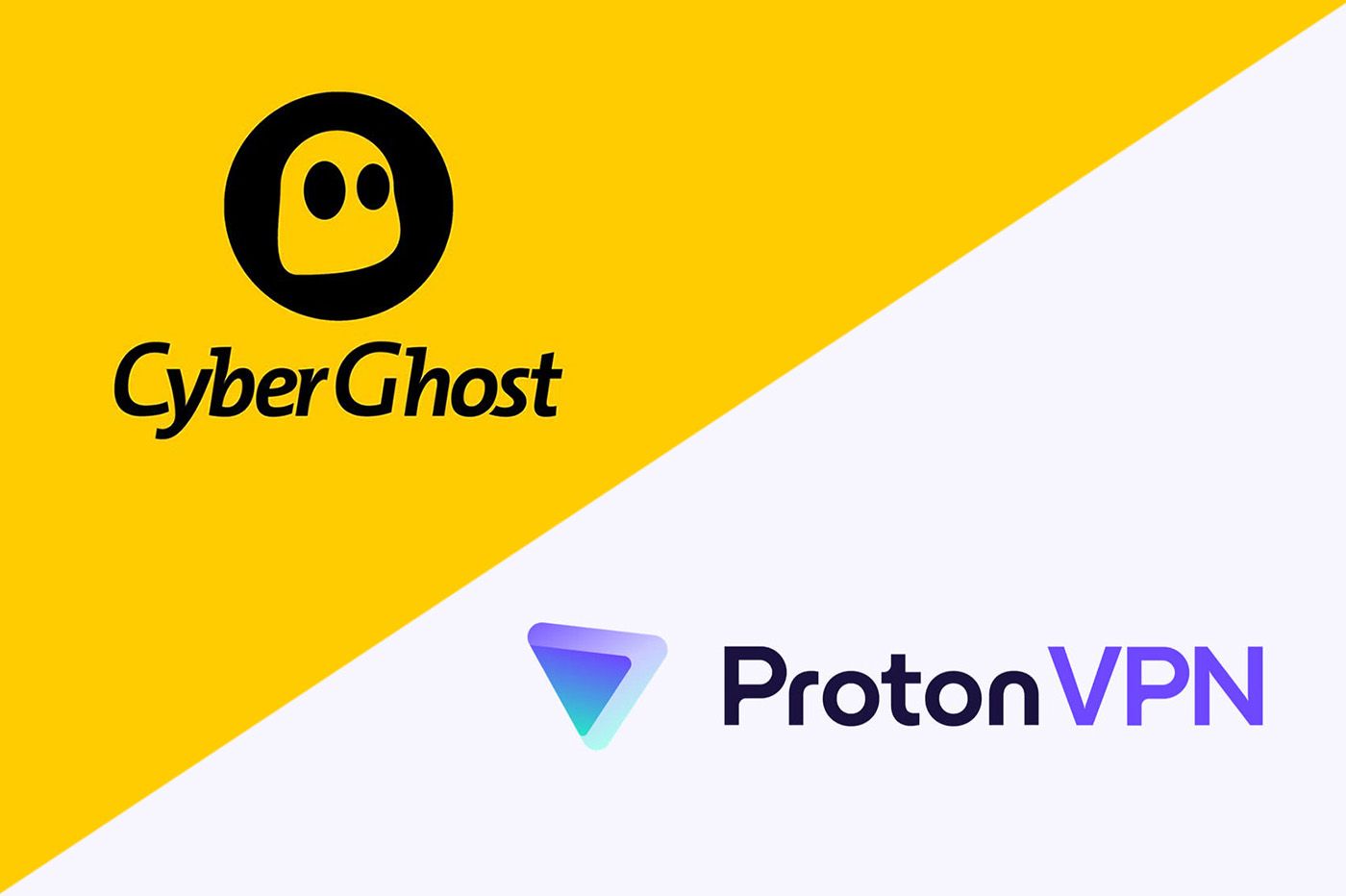
ProtonVPN vs CyberGhost: Apps & Ease of Use
To start this fierce battle between CyberGhost VPN and ProtonVPN, we’ll first need to discuss these VPNs’ apps and ease of use. Compatibility-wise, both VPNs excel when talking about desktop and mobile platforms.
This means that CyberGhost and ProtonVPN have apps for iOS, Android, Windows, macOS, and even Linux.
ProtonVPN’s Linux app is GUI-based, so it’s more than excellent. CyberGhost, sadly, still relies on the terminal commands, which beginners might not particularly like. Compatibility with other devices and platforms is sublime on both sides, though.
CyberGhost offers full router support and works on Fire TV, Apple TV, Android Smart TVs, Roku, Kodi, and even gaming consoles. ProtonVPN’s router support is here too, so you can expect to be able to use it on a variety of platforms that don’t natively support VPNs.
Both services also offer browser extensions but they’re not satisfactory. For example, if you use a VPN on Microsoft Edge, you’ll enjoy a proxy-like experience rather than have a full-fledged VPN like ExpressVPN or NordVPN. Interestingly, ProtonVPN lacks SmartDNS, which is a big red flag.
This means you won’t be able to set it up for streaming on, let’s say, the first gen of Firestick TV or a gaming console. CyberGhost remedies this by introducing full SmartDNS support, offering DNS addresses in 5+ countries. However, it does offer 7 simultaneous connections – a bit disappointing.
ProtonVPN’s 10 simultaneous connections are nothing to write home about either. But 10 is larger than 7, so doing some simple math brings us to the fact that ProtonVPN is advantageous here.
ProtonVPN
The good news is that both CyberGhost and ProtonVPN are very easy to use.
As you can see, ProtonVPN’s app looks fine on our Windows computer. It has the server list on the left, with the right side reserved for the world map. It looks like a discounted NordVPN world map, to be honest, but hey, nothing is perfect.
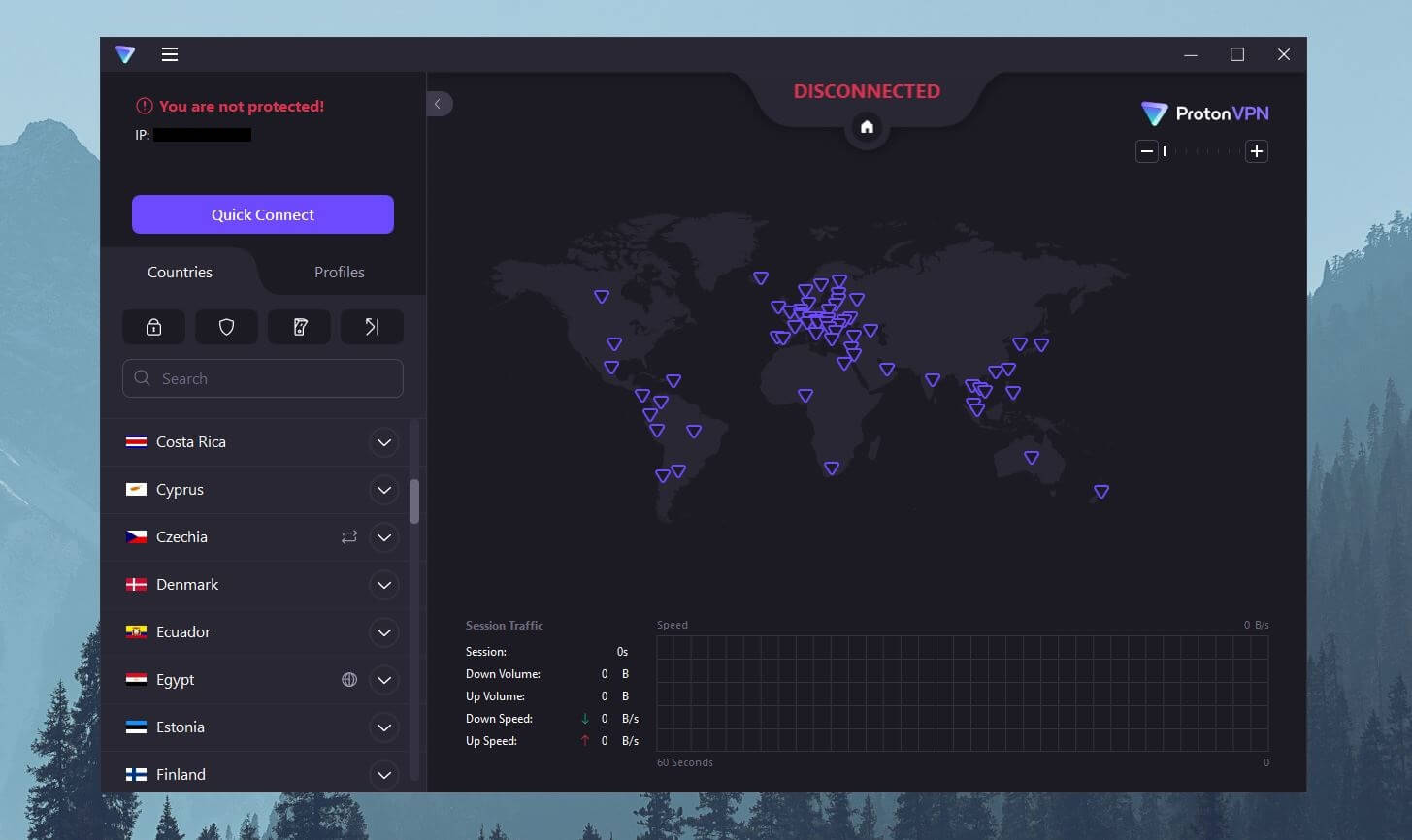
To connect to the server, double-click on it, and in 2-3 seconds, the connection will be set up. You can also use the Quick Connect button to connect to the fastest server according to your location. On the home screen, you’ll also find access to the kill switch, port forwarding, an ad blocker, and Secure Core.
We’ll address these features later in our ProtonVPN vs CyberGhost duel. The Settings menu is “hidden” behind the three horizontal lines in the top-left corner of the screen. Click on it, open Settings, and you’ll easily find all VPN-related features. ProtonVPN is very simple here.
It lets you toggle on and off each feature with a click. Besides, it offers plenty of excellent features, yet, they’re so easy to access, which makes ProtonVPN miraculously intuitive. The same story is on iOS and Android phones, where ProtonVPN shows a high level of polish.
Here, the apps resemble a look similar to what we’ve seen on Windows, macOS, and even Linux. However, since we’re discussing mobile apps, they’re slightly easier to use. Overall, the user experience is at the top level and we can’t complain.
CyberGhost
CyberGhost looks great on all desktop platforms. Granted, it’s a bit more complicated to use than ProtonVPN but nothing that’ll make you infuriated. The left side is, again, reserved for the server list, or better side, the type of servers you need.
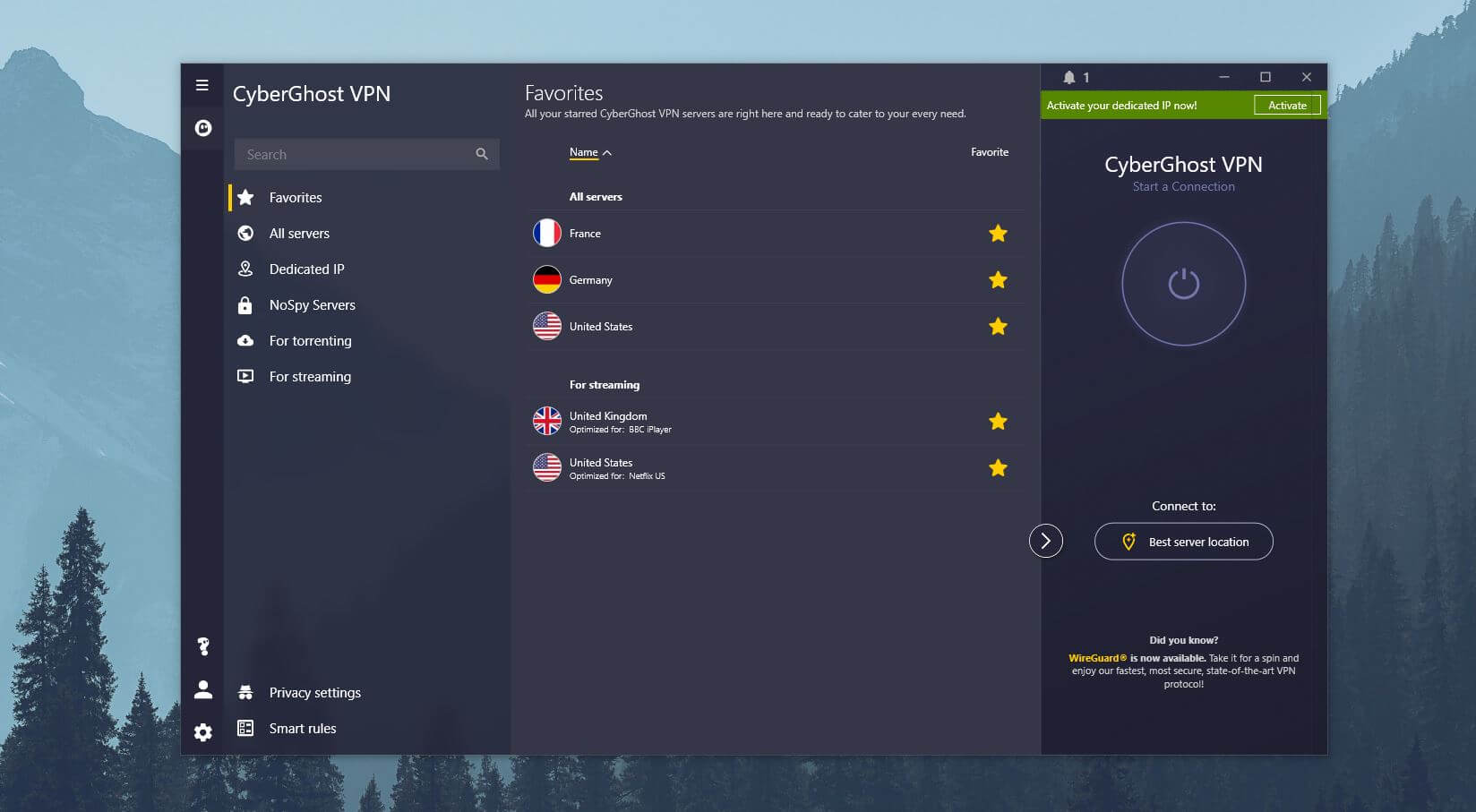
By choosing “All Servers”, you can open the full server list, double-click on the location you want, and connect to it quickly. The home screen gives access to specialty servers for streaming, torrenting, dedicated IP, and NoSpy servers that we discussed in our CyberGhost review.
The middle portion of the app will show you the server list, while the right side is taken by the connection button. When you connect, you’ll also see the protocol you’re using here, as well as a few other tidbits. Now, we also like the search bar in the top-left corner.
It makes connecting to a server of your choice easier. What we don’t like is that CyberGhost’s features are scattered around several menus. For example, Smart Rules is reserved for split tunneling and WiFi protection, while Privacy Settings is occupied by an ad blocker, DNS leak protection, and a kill switch.
The Gear icon lets you access the protocol selection, MTU size, and a few other VPN-related features. It’s a bit confusing, which can’t be said about its mobile apps. They’re much simpler and all features are easier to access. Probably because there aren’t that many of them.
Who Wins?
The first round of our ProtonVPN vs CyberGhost VPN duel is already intense. ProtonVPN is slightly easier to use and offers more simultaneous connections. CyberGhost has better compatibility and even includes SmartDNS, which is easy to set up across many devices.
That said, this round will be a DRAW.
Security & Privacy: Which One Is Safer to Use?
Security and privacy are the two factors in which ProtonVPN and CyberGhost show exceptional results.
However, in this ProtonVPN vs CyberGhost analysis, we must examine both services in-depth to see who has an edge.
Security Features
First, we’ll talk about their security features but focus more on those that they share. You see, providers like CyberGhost and ProtonVPN come with a basic set of features that include:
- AES-256 encryption. Also known as bank-grade encryption. The highest possible standard.
- A kill switch. This is great for keeping IP leaks at bay and making sure you don’t compromise your privacy if the VPN connection drops.
- Split tunneling. It lets you choose which apps and sites will be routed through the VPN tunnel and which won’t, which can be handy for local shopping sites or banking apps.
- IPv6/DNS leak prevention. It’s self-explanatory. A feature for preventing any form of leaks.
- WireGuard, OpenVPN, and IKEv2 protocols. WireGuard is especially important here, as it’s the most modern protocol focused on privacy and top-notch performance.
One thing to note is that both providers have their, let’s say, proprietary features that we’ll discuss in a minute. For now, we should mention that both have RAM based servers, which is relevant for preventing unwanted logging. Each server is wiped clean after it’s restarted, losing all data in the process.
Another feature worth mentioning is Private DNS. CyberGhost and ProtonVPN use proprietary DNS servers to handle your DNS requests. It’s a far cry from free DNS services that frequently store your browsing history and divulge it to third parties for a bit of cash.
Finally, the feature that both VPNs share is an ad blocker. CyberGhost’s ad blocker is just… well, an ad blocker, while ProtonVPN calls it NetShield. Don’t let the fancy name fool you – they’re the same.
What Are the Differences?
In terms of differences, to be frank, there aren’t many of them. We’ll mention CyberGhost’s NoSpy servers. These servers are in Romania, which is CyberGhost’s jurisdiction. This tells us that CyberGhost controls and OWNS these servers instead of renting them.
As such, the privacy on these servers is much more accentuated because of no third parties involvement. ProtonVPN has Secure Core servers, though. Secure Core servers function similarly to MultiHop. Once you connect to one Secure Core location, your traffic will pass through 2 servers.
This makes you impossible to trace online and gives you protection against a plethora of cyber-attacks. Vital to point out is that ProtonVPN owns these servers fully and they’re housed in Sweden, Switzerland, and Island, across underground data centers and former military bases.
Another feature that ProtonVPN has is Alternate Routing. This should help bypass censorship in some countries but as you’ll soon see, it won’t function that well. ProtonVPN also comes with the Stealth VPN protocol on macOS, which doesn’t seem to work in China – more about that later in the CyberGhost vs ProtonVPN analysis.
Other features of ProtonVPN and CyberGhost include full Tor over VPN compatibility and the option to use UDP and TCP variants of OpenVPN. Essentially, they’re not very different in terms of features, despite offering a few unique security quirks that we’re glad to see.
Is There a No-Logs Policy?
To end this CyberGhost vs ProtonVPN security comparison, we must go over their privacy policies. The good thing is that both are free of logging and you can expect the highest level of privacy. As said, CyberGhost’s HQ is in Romania, while ProtonVPN resides in Switzerland.
Both countries are known for stern privacy laws. Romania is outside the data-collection alliances and so is Switzerland, with the utmost respect for your privacy. As you can see below, CyberGhost indeed keeps no logs on its servers apart from a few mandatory bits of information.
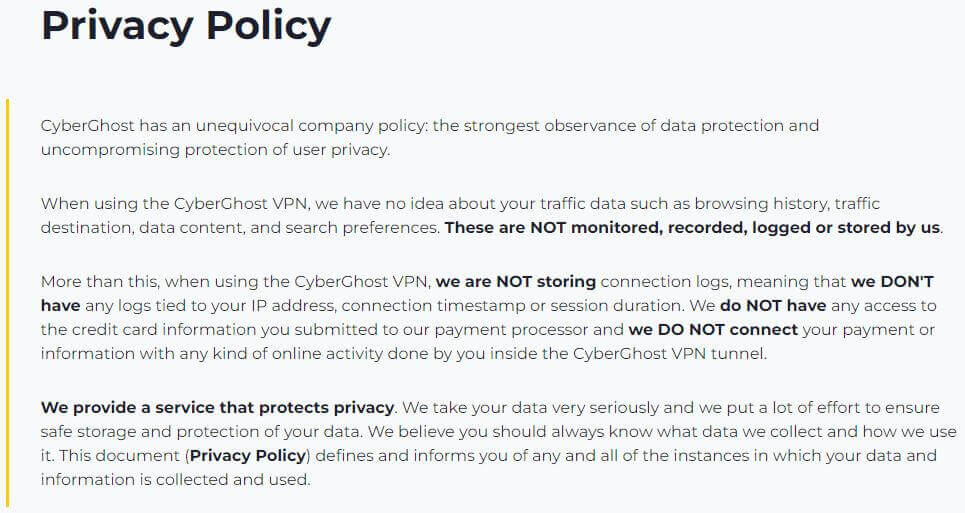
Data like your browsing history, DNS requests, IP address, timestamps, and others aren’t stored on its servers. This is further implied by a third-party audit from Deloitte. The company inspected CyberGhost recently, going over its full server infrastructure in a comprehensive audit.
Needless to say, it concluded that CyberGhost adheres to its promises. On top of that, it publishes transparency reports several times a year, adding to its trustworthiness.
Many people are wondering how safe ProtonVPN is? Well, we’d be fools for saying it’s not. The excerpt from the FAQ says everything.
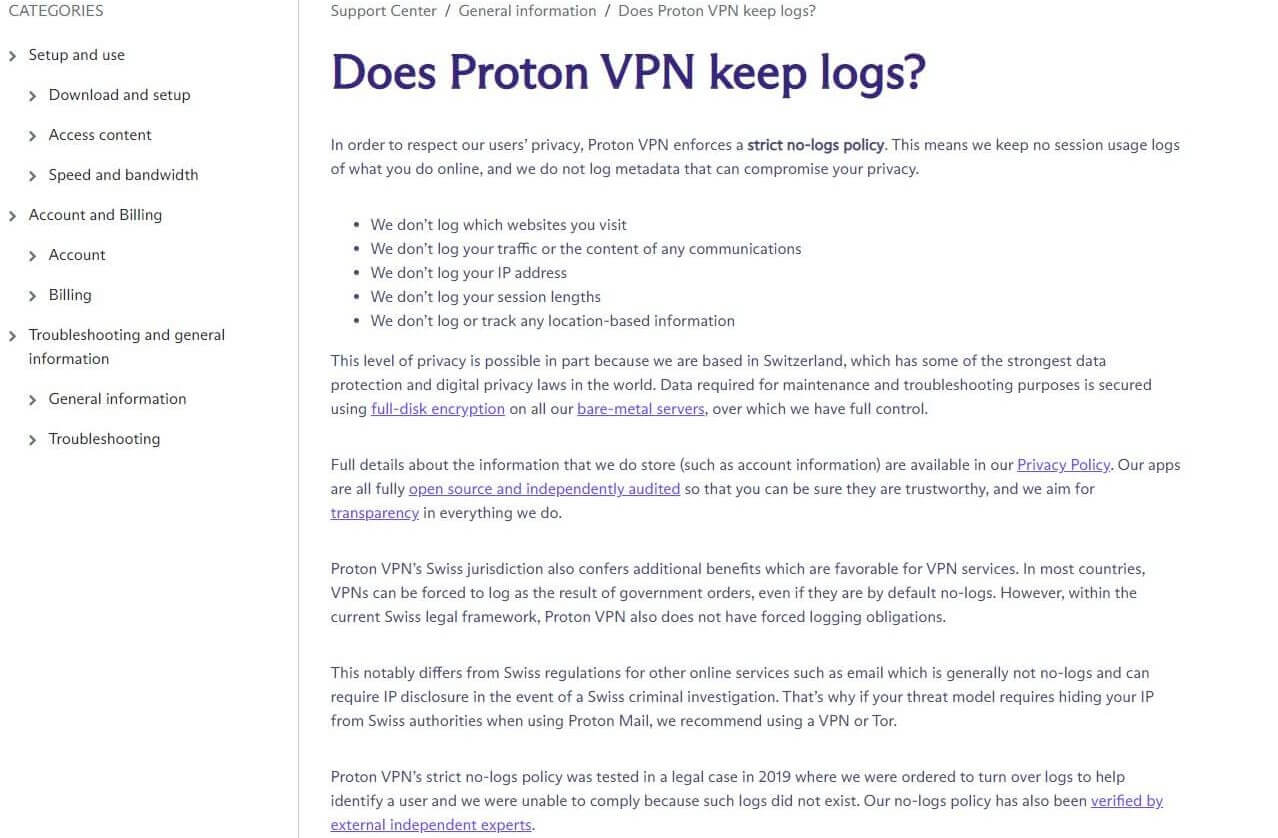
We can see that ProtonVPN stores ZERO information that could compromise you. No IP addresses, session length, traffic destination, browsing history, and geolocation are stored on its bare-metal, RAM-only servers. ProtonVPN excels in privacy and proves that through third-party audits.
The first audit was from SEC Consult, with the second audit taking place in 2022 by Securitum – a leading European security auditor. All in all, we can digress by saying that none of the providers keep logs, which is a relief for those worried about their privacy.
Who Wins?
Having in mind everything we said so far, this round of our CyberGhost vs ProtonVPN comparison is yet another DRAW. We must admit that CyberGhost represents a staple of secure and safe VPNs. However, we can’t deny ProtonVPN’s excellence and technical prowess that make this VPN among the most advanced on the market.
CyberGhost vs ProtonVPN Streaming Test
Moving on with this duel, we need to discuss streaming. If this is your #1 criterion, which VPN to buy – ProtonVPN or CyberGhost? Again, these two are extraordinary for streaming, offering solid performance and thousands of servers.
Starting with Netflix, ProtonVPN and CyberGhost are almost equal. They work with around 10 libraries, including those from the US, Canada, Japan, the UK, and many European catalogs. CyberGhost offers special streaming servers for additional advantage.
They’re optimized for a myriad of streaming services and TV channels. For example, these servers let you watch MotoGP races live or stream the latest season of F1 anywhere. Another perk is that you can access platforms like Disney+, ABC, Hotstar, Prime Video, and others.
ProtonVPN indeed works well and can unblock a wide gamut of services. However, we detected that ProtonVPN sometimes won’t work with more “demanding” services like Hulu. This happens from time to time and is easily remedied by switching to another server or clearing your browser cache.
Still, the provider feels slightly less reliable in this regard but not in a way that you should be alarmed or worried. Besides, ProtonVPN also has a few dedicated streaming locations, alas, not as many as its rival. The provider is made more for privacy and security rather than entertainment.
We can, however, report that both showed decent streaming speeds. No lagging, buffering, and endless loading screens even when using distant servers. Lastly, SmartDNS in CyberGhost makes streaming on every system possible. ProtonVPN lacks this feature.
Who Wins?
In this part of the duel, CyberGhost WINS over ProtonVPN. It’s slightly better for streaming, plus, it offers many dedicated streaming locations and a tad faster speeds for this purpose, which you’ll see soon. Not to mention its SmartDNS support which ProtonVPN lacks – another huge advantage.
CyberGhost vs ProtonVPN Speed Comparison
While we’re on the subject of speed and performance, let’s talk about it further. Our ProtonVPN vs CyberGhost speed test will tell you which VPN is faster. Before we move on to our test results, we first must properly set up the entire testing procedure.
At the time of writing this comparison, we were in Europe. When doing the speed test without using a VPN, our results looked like this:
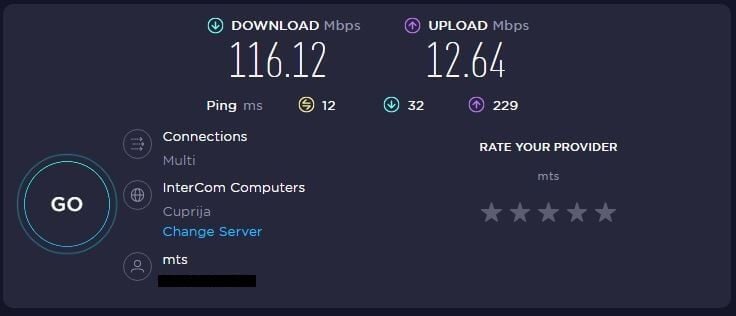
Roughly, our download speed is around 120 Mbps, with an upload speed of around 13 Mbps. Our ping is also quite low, at 12 ms. Now, we tested both VPNs for 3 days in a row, 3 times a day, using 4 server locations in the UK, the US, Australia, and Japan.
The protocol we used is most likely WireGuard. We set both VPNs to Automatic, which means they selected the best protocol according to the server we were using.
Since WireGuard is the fastest protocol (see our WireGuard vs OpenVPN comparison), we can, with certainty, say that these speeds are produced by that protocol.
Now, let’s examine the speed test results together.
CyberGhost
UK:
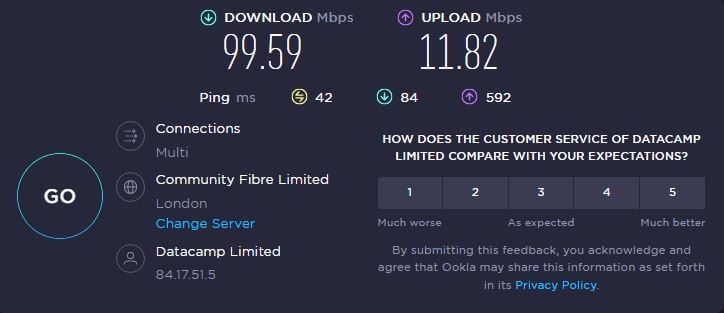
US:
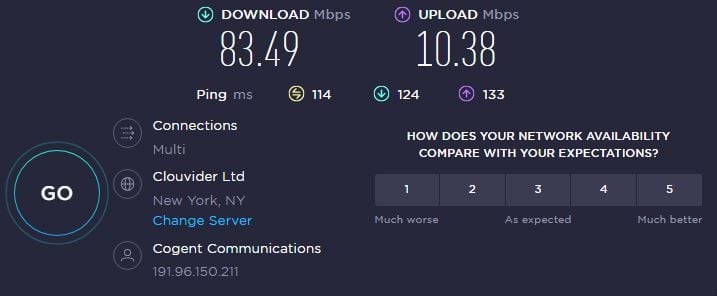
Australia:
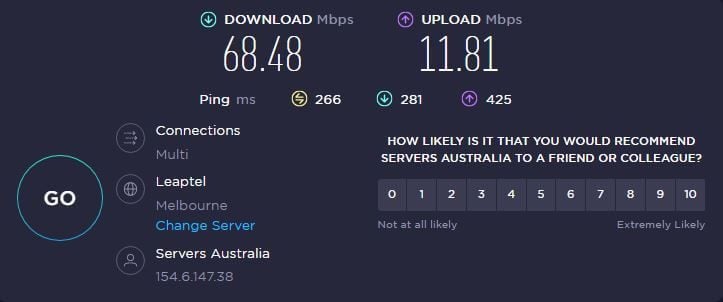
Japan:
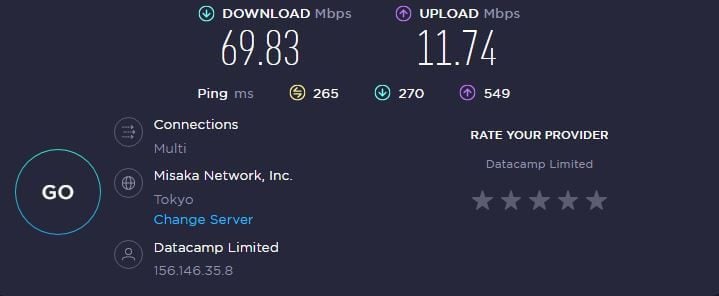
ProtonVPN
UK:
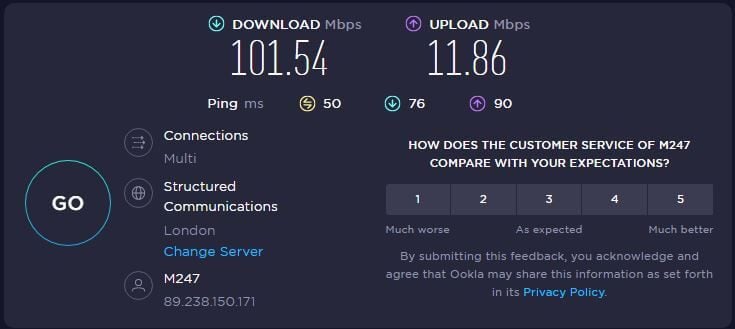
US:
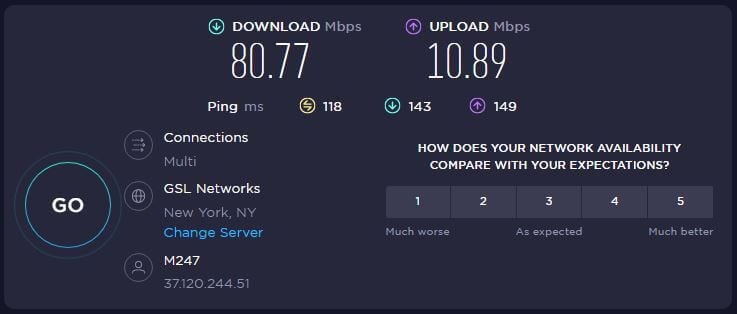
Australia:
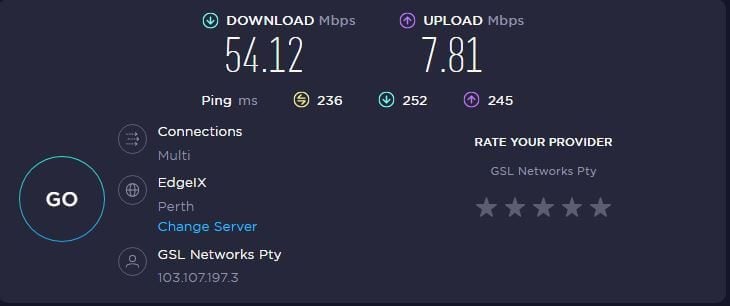
Japan:
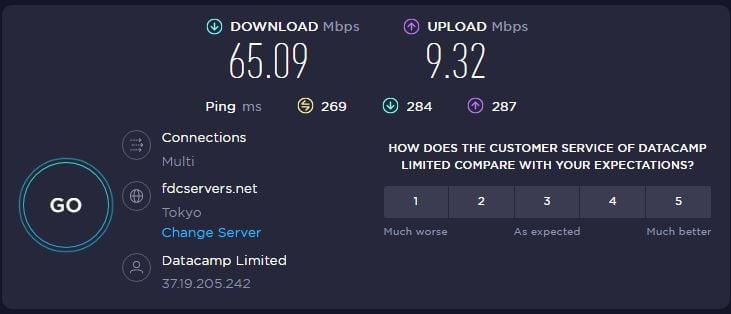
Who Wins?
As you can see, CyberGhost WINS this speed test round and we’ll explain why. ProtonVPN was faster on the UK server but only a bit. The other 3 servers in the US, Australia, and Japan were a win for CyberGhost that displayed faster upload and download speeds than ProtonVPN.
In terms of latency, it’s more or less similar. Albeit, we noticed that CyberGhost is slightly better here, with a tad lower latency on average. In real-world use, this VPN feels faster, which is most important, and this especially rings true on more distant servers.
Torrenting: ProtonVPN or CyberGhost VPN?
P2P activities are safe and secure with encryption from a VPN. However, not every VPN is optimized for uTorrent, BitTorrent, and other clients. Don’t fret, though. For torrenting, it’s pretty much irrelevant which VPN you’ll choose, ProtonVPN or CyberGhost.
For one, both of them have dedicated P2P servers. CyberGhost has them in almost every country that it offers, and they’re here to bring excellent performance and speeds for this purpose. ProtonVPN’s servers – at least some of them, are considered optimized for P2P – you’ll see that in the app.
The good thing is that regardless of the server in place, torrenting will work. This is indicated by our screenshots below, both of which show ProtonVPN and CyberGhost downloading Linux Mint through qBitTorrent.
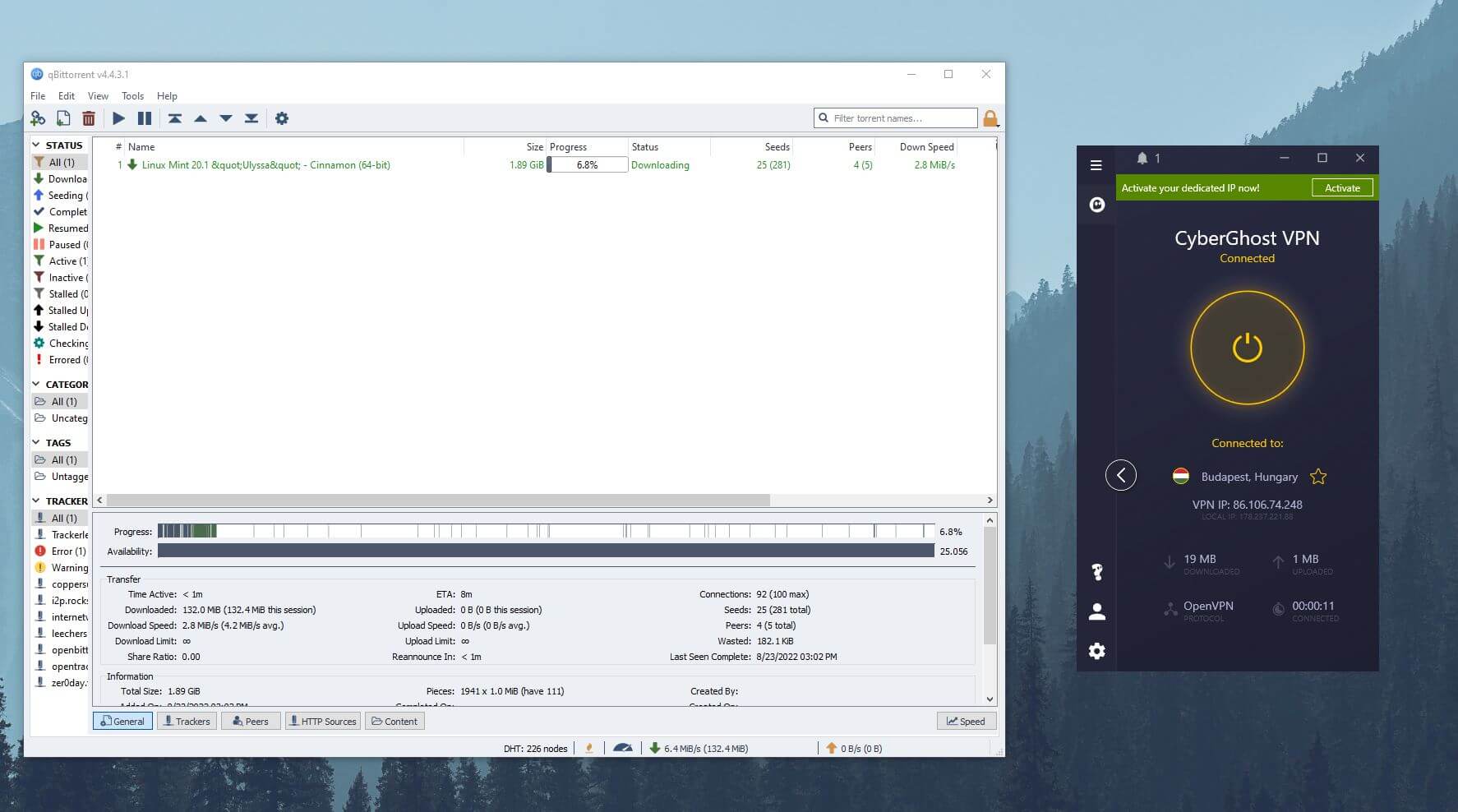
Are there any differences? Not exactly.
If we compare their speeds, they’re neck and neck. Privacy and security-wise, it’s the same. Both stay away from any logging that could expose your torrenting activities and ruin your privacy. ProtonVPN does have one feature that CyberGhost doesn’t – port forwarding.
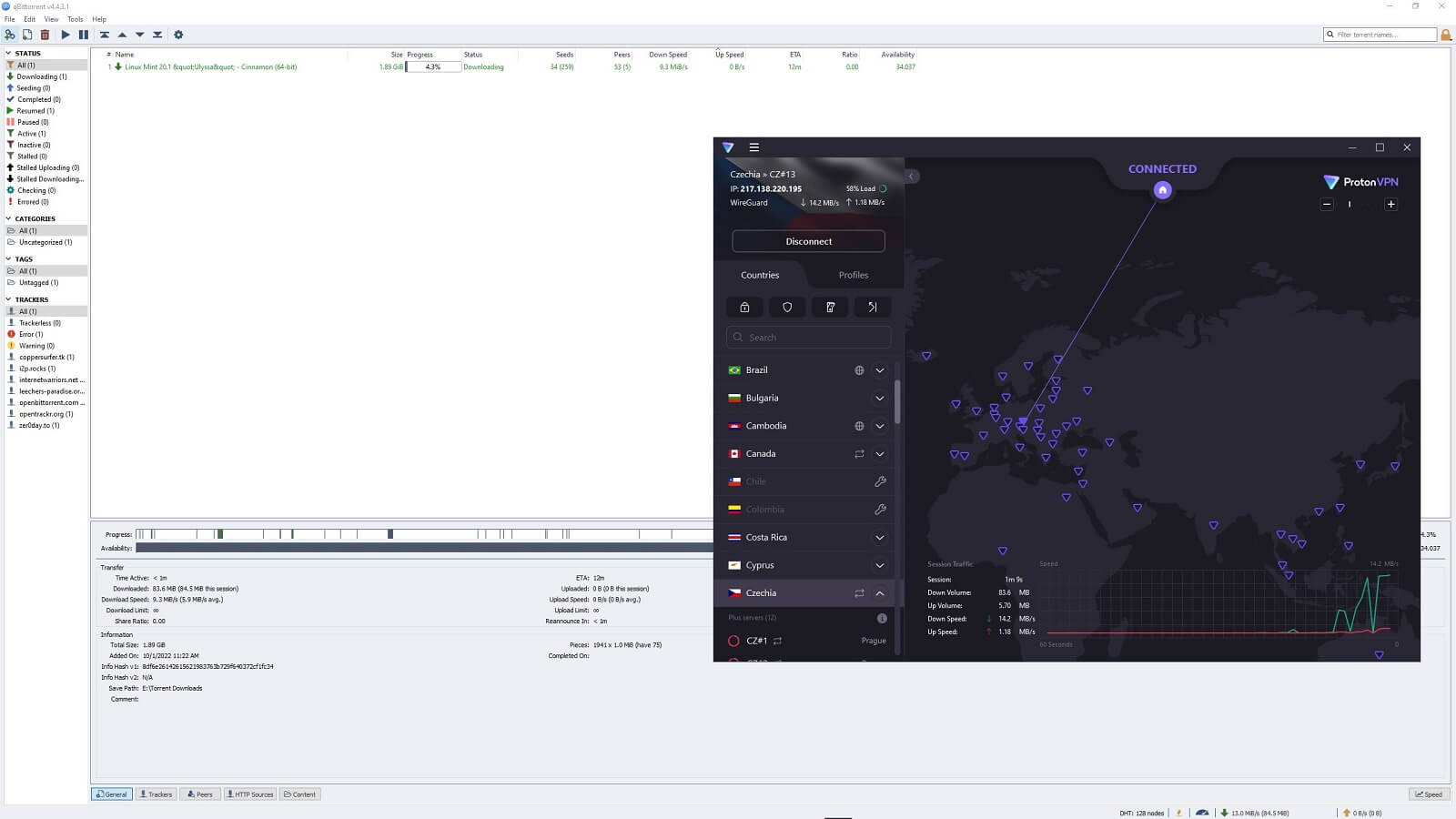
However, we don’t think this feature is necessary. Yes, it can speed up your downloads but you don’t really need it if you’re using ProtonVPN because the provider is already fast enough. Besides, it’s not the best solution for privacy because you’re trading it for a tad better performance.
Who Wins?
In this part of our CyberGhost vs ProtonVPN duel, it’s easy to say it’s a DRAW. As we’ve learned, you’ll have zero issues with these providers. Both are P2P-capable, offering splendid performance and thousands of torrent-friendly servers in dozens of countries.
Are CyberGhost and ProtonVPN Working in China?
Obfuscation and obfuscated servers are crucial for those looking for a reliable VPN that works in China. Without these features, it’s impossible to slide under the Great Firewall’s radar and use the service normally. Let’s start with ProtonVPN. As said, it does offer Stealth VPN and something called Alternate Routing.
The latter is available on all platforms and basically allows you to access the VPN when ProtonVPN’s servers are blocked. What’s more, ProtonVPN advertises this as a feature for bypassing censorship. Unfortunately, China is mentioned nowhere because the VPN won’t work in the country.
Don’t believe us? Well, here’s something we found on its official site:
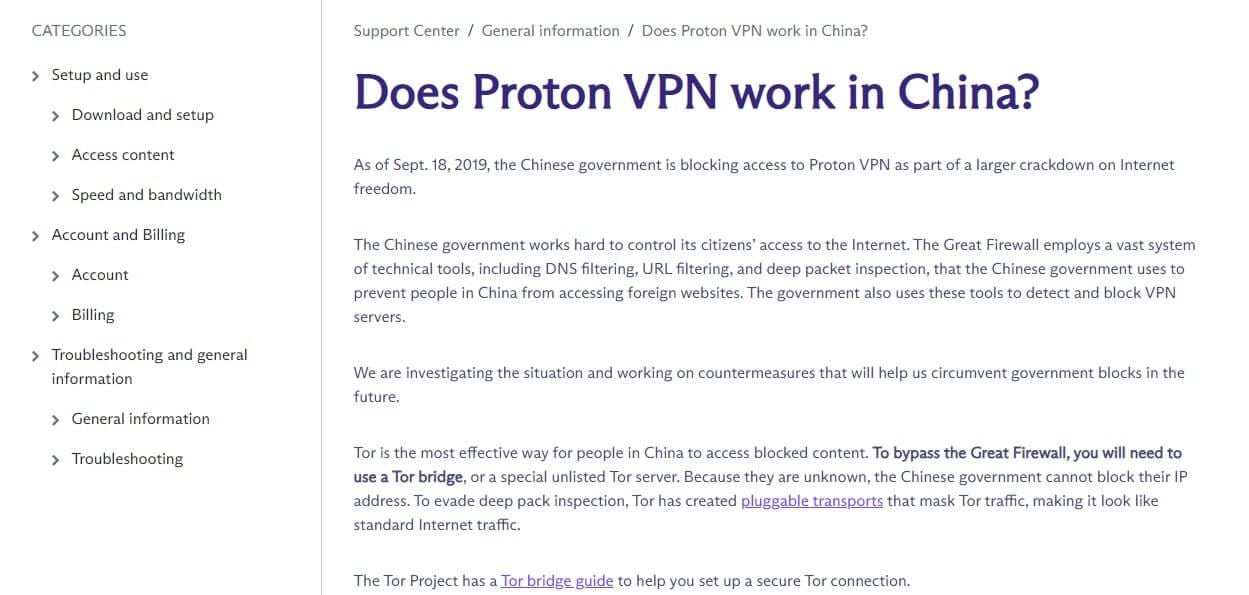
Proton openly admits to not working in the country. But what about the Stealth VPN protocol? Well, it also won’t work, and despite offering this protocol on macOS, users of this system shouldn’t have their hopes too high. CyberGhost is pretty much the same.
This VPN has no obfuscation, and by extension, won’t work in China. We tested CyberGhost at least 100 times during the years and it was a long time ago when it worked properly. ProtonVPN stopped in 2019, while CyberGhost’s days of working in China ceased even before that.
If you’re packing your bags for China, we recommend avoiding these VPNs. Instead, ExpressVPN can be used in China and its annual plan with 3 free months and a 49% discount should be your deal. Alternatively, you can also use NordVPN and Surfshark as cheaper but slightly inferior VPNs.
Who Wins?
This round of our CyberGhost vs ProtonVPN analysis, once again, ends up in a DRAW. Neither of the VPNs works in China, rendering them useless. In other countries like the UAE, Qatar, and Turkey, these VPNs still work well. Anyways, these are less censored locations that usually don’t pose a challenge even to lower-quality services.
ProtonVPN vs CyberGhost VPN Server Fleets
Speaking about low-quality VPNs, CyberGhost and ProtonVPN can’t be listed as such when talking about their server fleets.
Both VPNs are indeed jam-packed with server locations but one is better. Which one – ProtonVPN or CyberGhost VPN? Let’s answer this burning question.
ProtonVPN (3,000+ servers in 65+ countries)
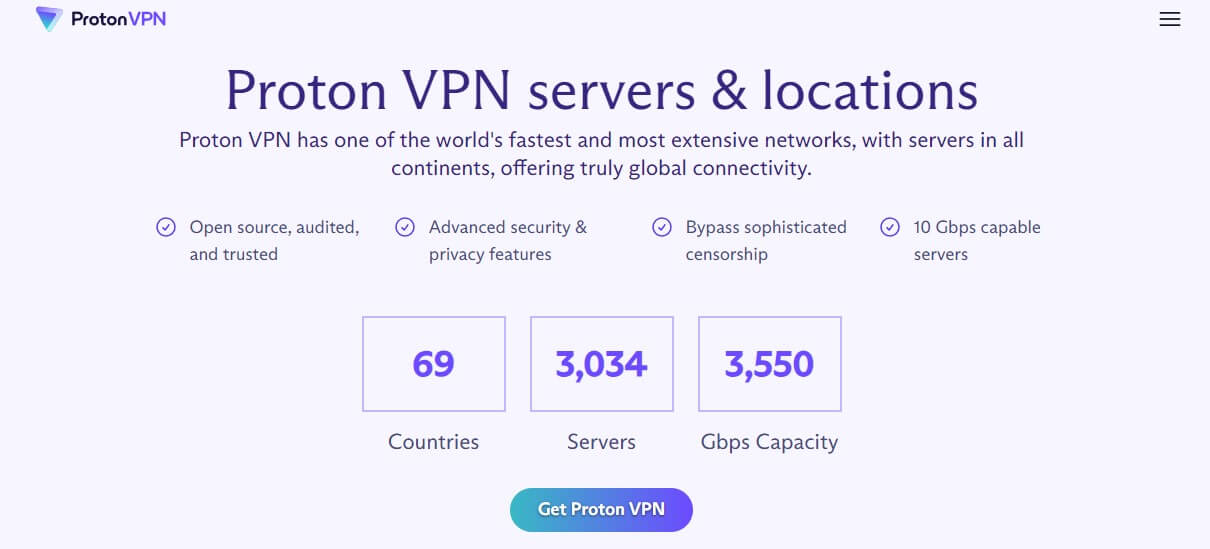
ProtonVPN’s days of a small server network are behind us. In 2025, it has over 3,000 servers in almost 70 countries – quite decent. During this comparison, we mentioned plenty of specialty servers for torrenting, Tor over VPN, streaming, and Secure Core.
That said, the server variety is all but unsatisfying. The server distribution is remarkable, too. ProtonVPN’s server network is mostly stationed in the US but of course, other popular locations are here. By that, we mean the UK, Canada, Japan, Australia, Europe, and some African countries.
We like ProtonVPN’s inclusion of virtual servers in countries where having physical servers is obstructed due to privacy-unfriendly laws. Such servers are, for example, in India. ProtonVPN has 10 Gbps servers based on RAM, so their quality is undeniable.
One thing to note is that the provider has 63 free servers that can be used by free subscribers. Moreover, the service has a little over 100 Secure Core servers, so when you subtract these two from the total server list, you get about 2,800 Plus or “normal” servers.
CyberGhost (9,500+ servers in 100 countries)
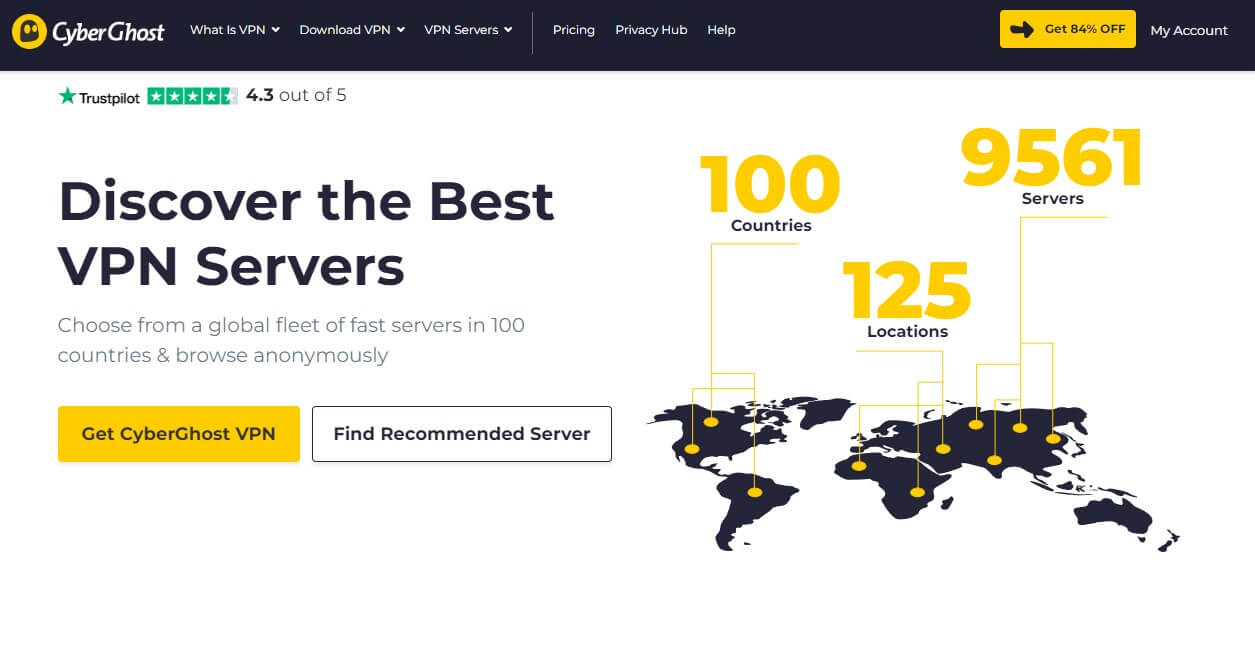
If you think ProtonVPN is awesome, wait till you hear about CyberGhost. This gargantuan provider sports 9,500+ servers in 100 countries and 125 locations. Compared to ProtonVPN, it’s definitely more serious, robust, and server-rich. By extension, its server fleet is more “capable”, so to speak.
Apart from servers for torrenting, CyberGhost offers servers optimized for streaming, gaming, and the aforementioned NoSpy servers. Like ProtonVPN, the whole infrastructure is 10 Gbps, allowing for some of the fastest speeds around. Another benefit is that all servers are based on RAM, as well.
However, that’s not the point. The point is just how ever-present the VPN feels. It offers a combination of virtual and physical servers, which allows it to cover almost the entire globe. CyberGhost VPN has thousands of servers across the US, Canada, Europe, Asia, Africa, New Zealand, Australia, and many others.
We like that its server network is clearly displayed even on the site. You can see exactly how many servers the provider has in each country. For instance, it has around 1,300 in the US, and a few hundred servers in the UK, Canada, and Australia.
Who Wins?
Both services offer specialty servers, with their entire server parks being RAM-only. However, CyberGhost is significantly larger than ProtonVPN. It has 9,500+ compared to 3,000 servers in 100 compared to nearly 70 countries in ProtonVPN.
Thus, CyberGhost WINS the round easily if you’re looking for a never-ending supply of servers.
Customer Support: CyberGhost VPN or ProtonVPN?
CyberGhost is known as one of the most user-friendly VPNs on the market. Its round-the-clock customer service is open 24/7 and available through live chat and email. Best of all, it’s quick to respond and won’t leave you waiting for long.
We like that its support is available in several languages, including English, German, and French. Moreover, its email support is also impeccable, so oftentimes, your issue will be tackled in about 10-15 minutes this way. Not to mention numerous self-help articles and FAQs.
CyberGhost has hundreds of how-to guides in addition to helpful Blog articles that you can read. Let’s not forget its activity on social media where you can also reach it and ask for help. ProtonVPN’s support functions differently. You won’t see the live chat widget when you go to its site.
For free users and those who are yet to become subscribers, ProtonVPN has email support only. Of course, you’ll have full access to FAQs, guides, and other nitpicks. However, live chat support is here too but is only usable by those who pay for the VPN – not the most welcoming thing.
Paid users won’t mind having this support, though. It works pretty fine and responds quickly to your questions. It’s a shame that Proton decided to lock it behind the paywall, as is the case with Atlas VPN and a few other providers we tested recently.
Who Wins?
On paper, both services have the same customer support means. But because the Romanian VPN doesn’t omit 24/7 live chat support from yet-to-become subscribers and is always here for you, CyberGhost WINS this round against ProtonVPN.
ProtonVPN vs CyberGhost Pricing Comparison
As we approach the very end of this duel, we need to discuss the prices of CyberGhost VPN and ProtonVPN. We think these will determine your final choice, as there are some stark differences.
ProtonVPN
In our ProtonVPN review, we criticized this VPN for being a bit too expensive. While it decreased its prices a bit, it’s still not something we’d consider cheap or affordable. Let’s look at its 3 subscription plans:

We also have this annual plan at around $6 a month or $72 a year. And finally, there’s the monthly plan at under $10, which isn’t so expensive.

If you’re a more ambitious user, you might be interested in its higher-tier plans. In this case, you’re looking at the inclusion of ALL Proton tools, like Mail/Calendar, Drive, and Pass. However, prices go up in this case and the 2-year plan is now around $8 a month or almost $200 every 2 years.
The annual plan also gets an increase to almost $10 a month, while the monthly plan is just around $13. All plans come with a 30-day money-back guarantee to ensure you can always get a refund if you’re dissatisfied. One more thing – Proton also offers a free VPN plan.
It has 3 server locations (Netherlands/Japan/USA), unlimited traffic, and 1 Gbps servers. On the other hand, it’s not optimized for streaming and torrenting and lacks features like NetShield, Secure Core, and many others. But let’s not pretend its free plan is bad – it’s, in all honesty, pretty good.
CyberGhost
CyberGhost has no free plans unlike ProtonVPN, although there’s a 24-hour free trial of its premium version. That isn’t an issue when you have a VPN this cheap. Look at its pricing below:

What’s good to know is that CyberGhost lets you purchase some useful add-ons for a silly price. For instance, on Windows, you can get Antivirus and Security Updater for just $1 a month, while a single dedicated IP is under $3 a month for the 2-year plan.
Another big advantage is a 45-day refund policy for 6-month and 2-year plans. While the monthly plan is subject to a 14-day refund policy, other plans give you much more freedom for testing compared to ProtonVPN. One thing to consider is the renewal price.
CyberGhost renews at the same price but early. If we do the math, it’s under $4.8 a month, which is still slightly more affordable than ProtonVPN’s equivalent. Its annual plan is, as you can see, closer to $6 a month, making it more expensive.
Who Wins?
This round goes to the provider with cheaper prices. Therefore, CyberGhost WINS the round against ProtonVPN hands down. Its long-term plans are way more wallet-friendly with a 45-day refund policy that the Swiss provider isn’t offering. No doubt, you’ll save more and get more with it.
Conclusion: CyberGhost Wins!
Okay, this was a tough battle but only one can emerge victorious. A score of 9:4 marks a pretty strong win for CyberGhost, a VPN that takes the title to Romania and represents a far better choice than ProtonVPN. What can we say? ProtonVPN fought bravely but in the end, lost the match.
The takeaway is that both providers are extraordinary in their own ways. ProtonVPN held its ground in the first and second rounds, especially the second one where we discussed security and privacy. This is by no means a bad VPN, as it’s almost equally capable of streaming, torrenting, and everything else.
Even its specialty servers are impeccable, with solid performance and RAM inclusion. Unfortunately for the purple team (ProtonVPN), the yellow team (CyberGhost) is just ahead in some of the most important aspects. Add cheaper prices to that equation and you can see why the Romanian provider is a superior choice.
This is what, for us, kills the joy of using ProtonVPN. Having to pay a high price for a 2-year plan seems a bit ludicrous. Recently, we compared NordVPN to ProtonVPN and even this provider is cheaper but a lot better. The Swiss company will need to sort things out with its billing team.
They have a super cool VPN that works perfectly fine but comes at a price many refuse to pay. Because of that, and many other reasons, CyberGhost remains a better choice and the VPN we recommend as a conclusion to this in-depth comparison.